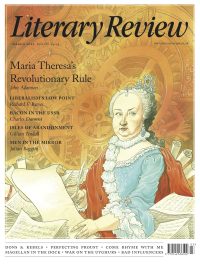William Wootten
Town & Country
Four new collections
In Ephemeron (Jonathan Cape 128pp £12), Fiona Benson’s capacity for capturing bodily sympathy in verse manifests as something like a superpower. In the opening series, ‘Insect Love Songs’, that power turns what could have been a dutiful eco-commission into something far more sensuous. In ‘Boarding-School Tales’, a sequence of poems revisiting the passions and deprivations of her schooldays, Benson summons her school self. The expressions of feeling for her fellow pupils can be extraordinary. She recalls the youngest boarder being scalded by hot chocolate from an urn, and how
The Victorian red-brick we lived in
became a strange extension of her lungs –
all those hollow rooms – and we swam
in scalding waves of pain.
When, in the section ‘Daughter Mother’, that sympathy is turned towards the injured body of Benson’s own daughter, it is hard not to wince.
There have been a number of impressive reshapings of classical tales in recent years, and it is a bold poet who would risk comparison with Alice Oswald and Anne Carson, but Benson’s ‘Translations from the Pasiphaë’ earns its place alongside their works. The extended sequence revisits familiar myths connected to Queen Pasiphaë and her children, including those involving her husband, King Minos, his employee Daedalus and her son the Minotaur, as well as far less rehearsed tales that surround them. Benson not only gives us the point of view of a female protagonist, Pasiphaë, in a traditionally hero-centred narrative, but also explores what these myths and their monsters might mean. At the centre of it is a disabled child and the feelings for him of his sister and mother:
He was beautiful, my son.
In his sleep, he shone.
I kissed the wet tufts of his fur,
his damp snout,
his long and delicate jaw.
Drawing on the popular tradition rather than the classical, Alison Brackenbury in Thorpeness (Carcanet 104pp £12.99) lays contemporary intonations across the patterns

Sign Up to our newsletter
Receive free articles, highlights from the archive, news, details of prizes, and much more.@Lit_Review
Follow Literary Review on Twitter
Twitter Feed
It wasn’t until 1825 that Pepys’s diary became available for the first time. How it was eventually decrypted and published is a story of subterfuge and duplicity.
Kate Loveman tells the tale.
Kate Loveman - Publishing Pepys
Kate Loveman: Publishing Pepys
literaryreview.co.uk
Arthur Christopher Benson was a pillar of the Edwardian establishment. He was supremely well connected. As his newly published diaries reveal, he was also riotously indiscreet.
Piers Brendon compares Benson’s journals to others from the 20th century.
Piers Brendon - Land of Dopes & Tories
Piers Brendon: Land of Dopes & Tories - The Benson Diaries: Selections from the Diary of Arthur Christopher Benson by Eamon Duffy & Ronald Hyam (edd)
literaryreview.co.uk
Of the siblings Gwen and Augustus John, it is Augustus who has commanded most attention from collectors and connoisseurs.
Was he really the finer artist, asks Tanya Harrod, or is it time Gwen emerged from her brother’s shadow?
Tanya Harrod - Cut from the Same Canvas
Tanya Harrod: Cut from the Same Canvas - Artists, Siblings, Visionaries: The Lives and Loves of Gwen and Augustus John by Judith Mackrell
literaryreview.co.uk